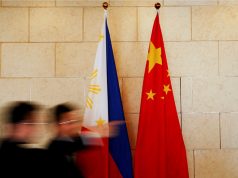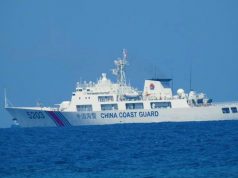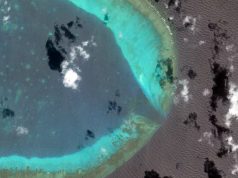
MANILA – (UPDATE 4, 12:42 P.M.) The final version of the Chairman’s Statement at the end of the 30th ASEAN Summit “took note of concerns expressed by some Leaders over recent developments” in the South China Sea, but stopped short of calling out China on its land reclamation and militarization, the inclusion of which four member-states were earlier reported to have fought for.

The tone of this year’s final statement was decidedly more subdued than what certain other member-states would have wanted, especially compared with the statement issued in last year’s summit hosted by Laos.
The final statement affirmed “the importance of maintaining peace, stability, security and freedom of navigation and over-flight in and above the South China Sea,” and cited progress made “to complete a framework of the Code of Conduct in the South China Sea (COC) by middle of this year, in order to facilitate the early conclusion of an effective COC.”
Early on, President Duterte had indicated he did not wish to tangle with China on the SCS issues, much less dwell at length on the matter in the 30th ASEAN Summit which the Philippines chairs.
His stance has drawn criticism from some Philippine leaders, who see it as a cop-out given that it was Manila that filed a case – and won – in the UN arbitral tribunal in The Hague.
In contrast to the 2017 final statement, the 2016 Chair’s statement explicitly made reference to the land reclamation and militarization of the SCS area, and underscored the need to ensure enforcement of the UNCLOS.
Back then, the members nations were “seriously concerned over recent and ongoing developments and took note of the concerns expressed by some Leaders on the land reclamations and escalation of activities in the area, which have eroded trust and confidence, increased tensions and may undermine peace, security and stability in the region.”
Paragraph 124 of the 2016 Statement said: “We emphasized the importance of non-militarization and self-restraint in the conduct of all activities, including land reclamation that could further complicate the situation and escalate tensions in the South China Sea.”
The 2016 statement also “reaffirmed the importance of maintaining and promoting peace, security, stability, safety and freedom of navigation in and over – flight above the South China Sea.”
In Paragraph 123, the 2016 ASEAN statement “reaffirmed the need to enhance mutual trust and confidence, exercise self-restraint in the conduct of activities and avoid actions that may further complicate the situation, and pursue peaceful resolution of disputes in accordance with international law, including the 1982 United Nations Convention on the Law of the Sea (UNCLOS).”
The 2017 Statement expressed serious concern over the escalating tension in the Korean peninsula. In Paragraphs 122 and 123, the 2017 statement did say this: “We urge the DPRK to immediately comply fully with its obligations arising from all relevant United Nations Security Council (UNSC) resolutions and stressed the importance of exercising self-restraint in the interest of maintaining peace, security and stability in the region and the world. We reiterate our full support for the denuclearization of the Korean Peninsula, and for concerned Parties to explore all avenues for immediate dialogue.”
Lobbying by Beijing
The outcome follows what two ASEAN diplomats said were efforts by Chinese foreign ministry and embassy officials in Manila to pressure ASEAN chair the Philippines to keep Beijing’s contentious activities in the strategic waterway off ASEAN’s official agenda.
It also indicates four ASEAN members who the diplomats said had wanted a firmer position had agreed to the more conciliatory tone in the statement.
China is not a member of ASEAN and was not attending the summit but is extremely sensitive about the content of its statements and considers it a barometer of the bloc’s dissent over its artificial islands in disputed waters.
China’s embassy in Manila could not be reached and its foreign ministry did not respond to request for comment on Saturday.
The ASEAN statement also noted “the improving cooperation between ASEAN and China”, and did not include references to “tensions” or “escalation of activities” seen in earlier drafts and in last year’s text. It noted some leaders’ concerns about “recent developments”.
Beijing has reacted angrily to members expressing their concern about its rapid reclamation of reefs in the Spratly archipelago and its installation of missile systems on them.
According to some experts, China is now capable of deploying combat aircraft on several of its manmade features.
Pointless to pressure
The softened statement comes as the current ASEAN chairman, Philippine President Rodrigo Duterte, seeks to bury the hatchet with China after years of wrangling over its maritime assertiveness, including its four-year blockade of the Scarborough Shoal.
Beijing has quietly eased that, in response to Duterte’s request to allow Filipinos to fish there again.
Duterte set the tone for the meeting on Thursday when he told reporters it would be pointless discussing China’s maritime activities, because no one dared to pressure Beijing anyway.
An ASEAN diplomat on Sunday said the statement was a genuine representation of the atmosphere of the Manila meetings.
“We respected the Philippines’ views and cooperated with the Philippines as this year’s chair,” the diplomat said.
“It clearly reflected how the issue was discussed.”
Duterte’s foreign policy approach represents a stunning reversal of that of the previous administration, which had close ties with the United States and was seen by China as a nuisance.
The Philippines government in 2013 challenged Beijing by lodging a case with the Permanent Court of Arbitration in 2013.
Two weeks into Duterte’s presidency last year, the Hague court ruled in favor of the Philippines, angering China. But Duterte has made it clear he would not press Beijing to comply anytime soon, and is more interested in doing business than sparring.
The chairman’s statement issued on Sunday made no mention to the arbitration case.
However, it did include in a section separate to the South China Sea chapter the need to show “full respect for legal and diplomatic processes” in resolving disputes.
Underlining Beijing’s sensitivity about the arbitration case, the two diplomatic sources who spoke to Reuters on Saturday said Chinese embassy officials had lobbied behind the scenes for that sentence to be dropped, and saw it as a veiled reference to the ruling.
Text of Final Chairman’s Statement below:
[pdf-embedder url=”http://media.interaksyon.com/wp-content/uploads/2017/04/FINAL-Chairmans-Statement-of-30th-ASEAN-Summit-29-Apr-2017.pdf”]









